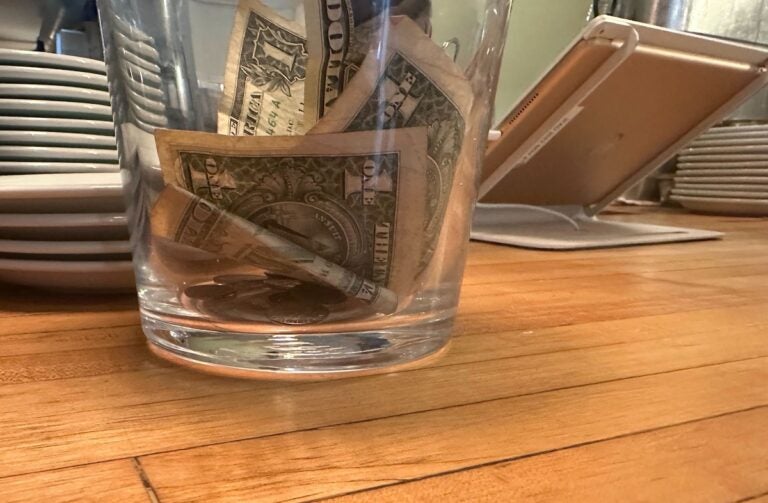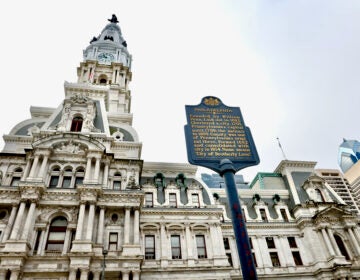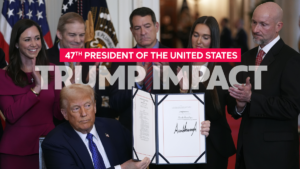What Trump’s no taxes on tips and overtime law means for Philly workers
Philadelphia workers already pay city wage taxes and state income taxes, but some can expect federal tax relief under a new law signed by President Donald Trump.
Listen 1:06
Philadelphia hospitality industry workers who rely on tips, whether cash or charged, can take advantage of a new federal tax deduction on top of the standard deduction for tips under a new law signed by President Donald Trump. A cash tip jar sits next the register inside a Philadelphia Old City coffee shop while baristas make drinks for customers. (Kristen Mosbrucker-Garza/WHYY)
From Philly and the Pa. suburbs to South Jersey and Delaware, what would you like WHYY News to cover? Let us know!
In Philadelphia, workers who earn tips or overtime and make less than $48 an hour — or $100,000 a year — could face unexpected tax hurdles and may want to seek expert advice before filing their taxes next year. That’s because a new federal law, promised on the campaign trail by President Donald Trump and included in the passing of his “big, beautiful bill,” will change the tax code.
As of March, there were 266,700 individuals across the Philadelphia-Camden-Wilmington metro area who worked in the hospitality and leisure industry sector, while the total nonfarm employment was 3.1 million.
For hospitality industry workers in jobs that typically rely on tips, whether cash or credit card gratuities, they can take advantage of a new federal deduction on top of the standard deduction for tips.
For individuals living in higher-tax states, such as New Jersey, and working in Philadelphia, there are other notable changes. There’s even changes for independent contractors working inside Philadelphia city limits regarding future business tax burden.
Here are key facts to keep in mind over the next few years. Some changes start in 2025 but end in 2028, while others expire by 2030 and some measures are permanent.
Do I have to pay any taxes on my tips and overtime pay?
Yes, even workers who qualify for the tax deduction must still pay taxes on their tips and overtime pay on the front end. Workers will see these taxes taken out of their regular paychecks — it’s not an accounting error.
Instead, eligible workers can apply for relief through a tax deduction during the regular tax filing season that ends in April 2026.
Often, employees have the option of a “standard deduction,” or can choose an itemized deduction if their tax situation surpasses the standard. But this is a special deduction that does not require itemization and can be taken on top of the standard deduction — up to $25,000.
Eligible workers are individuals earning up to $150,000 a year and couples filing jointly up to $300,000 a year.
The tax relief only applies to federal taxes. It does not apply to Medicare or Social Security taxes owed.
“You’re still going to owe the full Social Security and Medicare tax, which should be withheld from your paychecks on your tip income,” said Omeed Firouzi, a law professor at the Temple University Beasley School of Law and director of the Low Income Taxpayer Clinic. “And that’s good because even though those are regressive taxes, it at least goes towards your Social Security and Medicare credit.”
Firouzi was previously an attorney with Philadelphia Legal Assistance, a nonprofit organization that assists residents with legal issues.
Not requiring the deduction to be itemized may help more low-income taxpayers as opposed to itemization being required, he said.
“Usually if you have something where you can only claim it as an itemized deduction, you’re going to only really be able to benefit if it’s more than the standard deduction to reduce your taxable income,” he said. “We have had a lot of clients over the years who are service workers who make tips who may benefit in some way from this provision of the law depending on the facts. I’ve been following it closely.”
The standard deduction permanently increases under the new federal law to $15,750 for single taxpayers — a difference of $750.
Married filers can claim a $31,500 standard deduction — an increase of $1,500.
Taxpayers who are the head of their household can claim a standard deduction of $23,625 — an increase of $1,125.
“If you receive cash under the table or off the books, it is still income, and you have to report it on your tax return,” Firouzi said. “Not only is it ethical and that’s the legal thing to do, but you also may benefit from doing so because you have gotten a higher earned income tax credit and potentially higher child tax credit.”
Employees must still pay any applicable income taxes on city and federal levels — even on their tips and overtime pay.
So that means if there’s a county-wide or city tax burden — like Philadelphia’s city wage tax for residents and non-residents — those taxes will show up on regular paychecks on the front end too and will not be eligible for relief.
But the law is not the final form of what taxpayers should expect — there’s still a process. It will also not lower an employee’s adjusted gross income, but it would reduce their taxable income.
“If you have a higher adjusted gross income, then you might be able to benefit from a little bit higher earned income tax credit in the way they structured this,” he said.
Philadelphia lags behind in how much residents apply for their earned income tax credit. On average each year, about 50,000 residents don’t claim it, which means about $100 million is left in federal government coffers.
An individual with no children can qualify for the earned income tax credit if they make $18,591 or less. For a married couple with no children, it’s $25,511 or less. In general, for a head of household with three children earning $59,899 or less, they would qualify for the earned income tax credit.
The federal child tax credit is going up from $2,000 to $2,200 under the law.
That means if a worker earned $45,000 as their adjusted gross income and $10,000 of that money was earned in tips, their gross income remains the same, but the taxable income would be lower.
“The devil really will be in the details in terms of what they mean by entities covered or not covered,” Firouzi said, referring to which types of workers’ jobs may be considered tipped. “We can expect to see some U.S. Treasury rules and regulations that will further spell this out.”
If I don’t have a U.S. Social Security number, do I qualify for this tax relief?
No. The law is clear that this federal tax deduction is only for employees who have a legal Social Security number. This excludes some immigrants who may not have that level of documentation or legal permanent residents working in tipped industries.
Can my employer call my annual bonus or sales performance pay a tip so I can get tax relief?
No. While there is still a rulemaking process required through the U.S. Treasury that will provide more clarification for the Internal Revenue Service, the law is clear about the narrow group of eligible workers — those in industries who typically earn tips, such as hospitality industry workers.
The secretary of the treasury must publish a list of occupations that customarily and regularly receive tips within 90 days of the law being enacted.
What if my employer adds a service charge as a required gratuity to checks from big parties or events? Do I have to pay taxes on those tips?
Yes. Required gratuities in the form of a service fee or service charge are not expected to be eligible as voluntary tips from customers and would not be eligible for tax relief under the law.
“I fear that it won’t include service fees and those kinds of guaranteed things based on the language of the legislation, but it’s something that we’re going to have to see what regulations say,” Firouzi said.
What if my employer claims that I’m an independent contractor? Do I have to pay taxes on tips?
The new law does include independent contractors, but there are limitations, so not everyone will qualify. It excludes those working in the performing arts but would include a ride-hailing app driver or delivery person.
But the independent contractor’s gross income, including any cash or credit card tips, would be required to exceed their business expenses to qualify for the tax relief.
There’s already a lot of confusion in the market about independent contractor work.
First, workers should make sure they qualify as an independent contractor and run their own business. There’s a legal framework that exists to determine whether a worker is truly an independent business owner or misclassified.
“I represent a lot of people who are misclassified as independent contractors who are really employees. It seems like it would apply to anyone, including self-employed people, but I’m curious to see how that would work,” Firouzi said, referring to the federal tax law changes. “Which is a tax issue, because it means they would have to pay double the amount of Social Security and Medicare tax that they should be paying if they were really classified correctly [as employees].”
If that’s the case, and a worker is a business owner, then every dollar they earn inside the city of Philadelphia will now be subject to the city’s Business Income and Receipts Tax, which is a two-part tax on both gross receipts and taxable net income, in addition to the city’s Net Profits Tax.
While that change is not related to the new federal law, it will affect independent contractors who do business within city limits.
These business taxes are in lieu of the city’s wage taxes for employees. And while the most recent Philadelphia city law reduces the BIRT tax and city wage tax burden over time, it also halts a previous exemption of the first $100,000 in revenue.
That means tens of thousands of individuals will be paying business taxes in the city for the first time.
Do I have to pay taxes on overtime? How does that work?
The U.S. Department of Labor requires employers to pay eligible workers overtime for any hours in excess of 40 per week.
The temporary tax deduction would only qualify for overtime covered under the Fair Labor Standards Act with a $12,500 cap for individuals and a $25,000 cap for a joint return. There’s also an income limit of $150,000 for individuals and $300,000 for married taxpayers who file jointly.
There are some exceptions in certain industries, and sometimes employers will try to pay workers $1 more than their co-workers, telling the employee they are a manager just to exempt them from overtime pay, Firouzi said.
“Then the employer will use that to try and not actually give them overtime pay because they’re making above the salary threshold. And that’s not something this legislation would address,” he said. “The Department of Labor could create a rule that expands overtime by increasing the salary threshold. That would potentially help more people get overtime and it would reach more people, because not everybody will benefit from a tax deduction.”
What if I live in a high-tax state like New Jersey but work in Philadelphia?
The SALT deduction cap was lifted to $40,000 — up from $10,000. But it phases out for those with gross adjusted incomes over $500,000. It’s also temporary and reverts back to $10,000 in 2030.
“So more people who live in these high-tax states would potentially benefit from that,” Firouzi said. “It’s something you claim by itemizing, so if your standard deduction is higher than your state and local tax, it’s not really worth it for you to claim this. For people who live in Philly and Pennsylvania, it’s probably not going to be, generally speaking, worth it anyway.”
Will President Trump’s tax cuts reduce the overall cost of living for middle-class residents in Philadelphia?
It depends on the individual’s tax burden.
But since access to food and health care are also living expenses, it’s possible that the tax cuts may not make up for reductions in other benefits, such as loss of Medicaid coverage and SNAP benefits.
For example, the enhanced subsidies, or premium tax credits for Affordable Care Act insurance policies, are ending.
The law could affect middle-income individuals who take out money early from their retirement accounts, because it could push them over the federal cap and put them in a situation where they must repay all of their Affordable Care Act subsidies.
The law also ends federal student loan debt cancellation from being tax free. Under the American Rescue Plan Act, if federal student loan debt was canceled, it was not considered income, but that was a temporary measure and will now expire.
In general, the Penn Wharton Budget Model estimates that under the new federal tax changes, lower-income households and some in the middle class will be worse off, including future generations.

Get daily updates from WHYY News!
WHYY is your source for fact-based, in-depth journalism and information. As a nonprofit organization, we rely on financial support from readers like you. Please give today.












